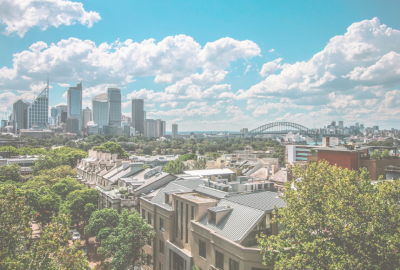7. Community
This article is an interview with four researchers about the role of community and community-based initiatives in climate adaptation in urban contexts
This article is an interview with four researchers about the role of community and community-based initiatives in climate adaptation in urban contexts
This document is an appendix to the Commons Transition Plan for the City of Sydney by the Sydney Commons Lab.

Recent research into waste has moved beyond focusing on individual behaviour change to the wider practices, systems, and social norms that construct and perpetuate waste. Running alongside this work on waste, community economy scholars have been exploring how communities form around and care for commons.
In answering the following research question: What design features allow for both comfort and mobility in the hot city, and what design features detract from this? What climate-resilient social practices are these features enabling and disabling? this report develops a new approach to understanding and designing cool cities: cool commons. The report sets out the new conceptual approach of Cool Commons.
Until recently, bottled drinking water was a cause of concern for development in the Global South; now, however, it is embraced as a way to reach the 2030 United Nations Sustainable Development Goal target 6.1 for "[u]niversal and equitable access to safe and affordable drinking water for all". Reaching SDG 6.1 through bottled drinking water is controversial as there are broad questions about how any form of packaged – and therefore commodified – water can be ethical or consistent with "the human right to water" that was ratified in 2010 by the United Nations member states.
Avec d’autres chercheuses et chercheurs engagés, je lutte pour rompre avec une conception universaliste du monde et opérer une transition vers un vivre-ensemble « centré sur le plurivers constitué d’une multiplicité de mondes enchevêtrés et co-constitutifs, mais distincts ». Dans le sillon de Dardot et Laval3, je comprends la révolution comme un moment d’accélération, d’intensification et de collectivisation d’une activité autonome et auto-organisée dans toutes les sphères de la vie économique, sociale, politique ou culturelle.
This chapter focuses on urban-based enterprises that are building direct links with rural producers and taking seriously the idea that urban consumers have a role to play in stewarding our agricultural environments and securing livelihoods for farmers. When these sorts of concerns are placed at the heart of the enterprise we find that economic innovations follow, and that along with producing benefits for farmers these innovations are also impacting employees and consumers.
The article focuses on free universities as grassroots responses to the crisis of universities worldwide, exemplifying how they contribute to the development of postcapitalist imaginaries in academia.